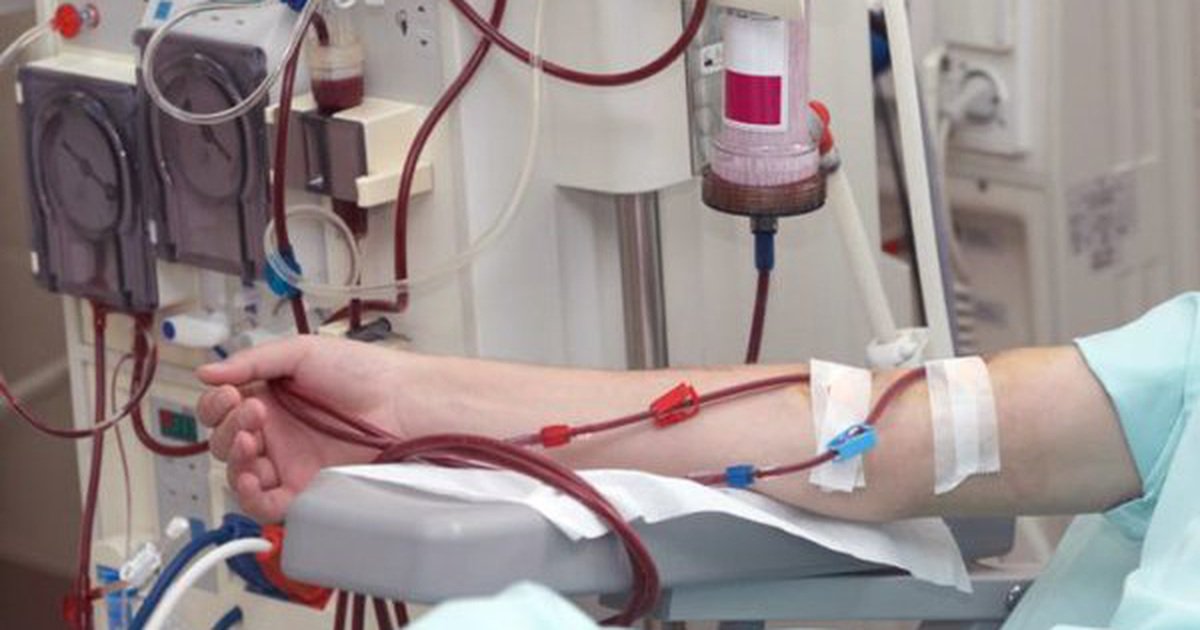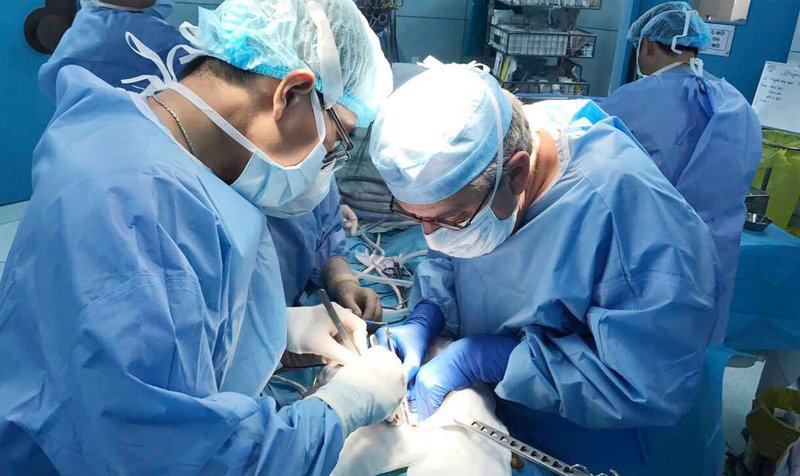How is glomerulonephritis treated?
Treatment for glomerulonephritis often includes measures to help control symptoms, reduce complications, and slow progression of the disease. If the kidneys are severely damaged, the patient needs to be switched to treatment for end-stage kidney disease.
1. Overview of treatment for glomerulonephritis
In general, the goal of treatment for glomerulonephritis is to protect the kidneys from further damage. Methods and results of treatment for glomerulonephritis depend on:
Acute or chronic form of glomerulonephritis; There is usually no cure for chronic glomerulonephritis. Some cases of acute glomerulonephritis, especially after a streptococcal infection, may improve on their own without treatment.
Causes, underlying diseases leading to glomerulonephritis; If there is an underlying medical condition, such as high blood pressure, an infection, or an autoimmune disease, treatment will focus on slowing or controlling the cause of your glomerulonephritis. However, there is a risk that kidney damage will continue to worsen even when the underlying disease is under control.
Severity of symptoms For acute glomerulonephritis and acute kidney failure, dialysis can help remove excess fluid and control high blood pressure. The only therapy for end-stage kidney disease is dialysis and a kidney transplant. If a transplant is not possible, usually because of poor general health, dialysis is the treatment of last resort for glomerulonephritis.

Lọc máu điều trị viêm cầu thận
2. What drugs should be taken for glomerulonephritis?
What medicine to take with glomerulonephritis is a common question for many people. Around this issue, doctors said that some drugs can control complications of glomerulonephritis, helping patients to be more comfortable. Specifically:
Blood pressure medications People with glomerulonephritis often have high blood pressure, so doctors will recommend drugs to lower blood pressure and preserve kidney function, commonly angiotensin-converting enzyme inhibitors or inhibitors of kidney disease. angiotensin II receptor blocker. Because blood pressure medications can initially decrease kidney function and change electrolyte levels, patients need frequent blood tests to monitor their condition. Your doctor will also recommend taking a diuretic, in conjunction with a low-salt diet;
Cholesterol-lowering drugs People with chronic kidney disease often have high levels of bad cholesterol, which increases the risk of heart disease. Therefore, treatment of chronic glomerulonephritis often uses statin drugs to lower cholesterol.
Medications to treat anemia In some cases, your doctor may recommend the hormone erythropoietin, sometimes with added iron, which helps support the production of more red blood cells, which can help reduce fatigue and weakness due to anemia.
Medicines to reduce swelling People with chronic kidney disease often retain fluid in the body, leading to swelling in the legs and increased blood pressure. Diuretics have the effect of maintaining the fluid balance in the body, often used in the treatment of chronic glomerulonephritis;
Bone-protecting drugs Your doctor may prescribe calcium and vitamin D supplements to prevent bone weakening and reduce the risk of fractures. Sometimes a phosphate binder is also needed to reduce blood phosphorus levels and protect blood vessels from damage by calcium deposition (calcification).
Besides specifying what medicine people with glomerulonephritis should take, the doctor will also periodically check and monitor to see if the disease condition is stable or worsens.
3. Treatment of end-stage kidney disease
If the kidneys are completely impaired, unable to process waste and fluids on their own, it is considered end-stage kidney disease. At this time, the patient will be treated for glomerulonephritis by the following methods:
Dialysis There are two methods of artificial dialysis. One is hemodialysis: A large external dialysis machine filters waste and excess fluid from the blood. The second is peritoneal dialysis: A thin catheter (catheter) is inserted into the abdomen, then a sterile solution is filled into the abdominal cavity to absorb waste and excess fluid. After a while, the dialysis solution carries waste out of the body;
Kidney transplant A kidney transplant is surgery to place a healthy kidney from a living or deceased donor into the patient's body. Although hemodialysis is not required, patients will still need to take medication for the rest of their lives to keep the body acclimating to the new organ.
Without dialysis or a kidney transplant, the third option for treating glomerulonephritis is conservative measures. However, people with complete kidney failure usually have only a few months to live.

Cấy ghéo thận
4. Future Treatments
Regenerative medicine has the ability to completely heal damaged tissues and organs, and is the solution and hope for people with kidney disease in general. This method helps:
Enhance the body's natural healing ability; Using healthy cells, tissues or organs from a donor to replace damaged ones from a patient; Deliver specific types of cells to diseased tissues or organs to restore function. Regenerative medicine methods are being researched and further developed in the future with the hope of slowing the progression of glomerulonephritis.
5. Lifestyle and home remedies
As part of chronic glomerulonephritis treatment, your doctor may recommend a special diet to help keep your kidneys from working too hard. Specifically:
Avoid high salt products: Limit the amount of salt in the daily menu to prevent or minimize water retention, swelling and hypertension. Reduce your daily sodium intake by avoiding foods with added salt, including many canned foods, fast foods, salty snacks, processed meats and cheeses; Choose foods with less potassium: Foods rich in potassium should be avoided such as bananas, oranges, potatoes, spinach and tomatoes. Choose foods low in potassium such as apples, cabbage, carrots, green beans, grapes and strawberries; Limit protein intake: The body creates waste products that the kidneys must filter out in the process of processing protein from food. To support the kidneys, your doctor may advise you to eat less protein to minimize waste in the blood, or suggest ways to reduce protein intake while ensuring a healthy diet. Protein-rich foods include lean meats, eggs, milk, cheese, and beans. Low-protein foods include vegetables, fruits, breads, and cereals. In addition, patients also need to adjust to a healthier lifestyle, especially those who have to live with chronic glomerulonephritis. Specifically:
Maintain a healthy weight; Good control of blood sugar in people with diabetes; Give up smoking; Try to have a normal life, do your favorite activities and keep working if possible; Set a goal of being physically active for at least 30 minutes every day of the week; Join a community that connects people with chronic glomerulonephritis - which provides useful information, listens and shares experiences of living with the disease. Depending on the underlying cause, the patient's condition, kidney function, and overall health, there are different treatments for glomerulonephritis. In addition to certain medications and medical techniques, your doctor may also recommend lifestyle modifications to help you cope well with glomerulonephritis, especially the chronic form.
Vinmec International General Hospital is a general hospital with the function of examining and treating kidney and urinary diseases and many other diseases. At Vinmec, we have also performed endoscopic diagnosis and treatment with modern medical methods for urinary kidney diseases, which not only brings high efficiency but also minimizes complications of recurrent disease. The great success is because Vinmec is always fully equipped with modern facilities, examination and treatment procedures are performed by a team of highly qualified and experienced doctors along with many complete medical services. perfect.
References: mayoclinic.org
Để đặt lịch khám tại viện, Quý khách vui lòng bấm số HOTLINE hoặc đặt lịch trực tiếp TẠI ĐÂY. Tải và đặt lịch khám tự động trên ứng dụng MyVinmec để quản lý, theo dõi lịch và đặt hẹn mọi lúc mọi nơi ngay trên ứng dụng.
MORE:
Treatment of glomerulonephritis Glomerulonephritis: Causes, symptoms, diagnosis and treatment Diagnosis and treatment of chronic glomerulonephritis
Treatment of glomerulonephritis Glomerulonephritis: Causes, symptoms, diagnosis and treatment Diagnosis and treatment of chronic glomerulonephritis
Bài viết này được viết cho người đọc tại Sài Gòn, Hà Nội, Hồ Chí Minh, Phú Quốc, Nha Trang, Hạ Long, Hải Phòng, Đà Nẵng.






